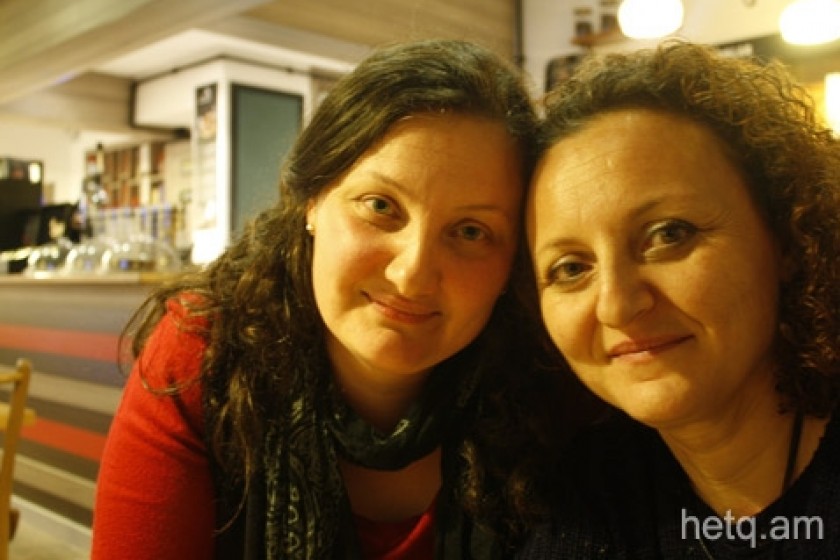
The Emeksiz Sisters of Istanbul: “The Armenians call us Turks, and the Turks call us Armenians”
The Emeksiz sisters of Istanbul are on a mission to tell people in Armenia about the fate of their Armenian grandfather Khachik and others who shared the same fate due to the 1915 Genocide.
The two sisters, both Emeksiz, are named after their Armenian grandfather Khachik Emeksizian.
Born in the Uzunmahmud village in the Ottoman Kaza of Ordu on the Black Sea, Khachik Emeksizian was seven years old in 1915. The boy survived the Genocide because he was taken to a nearby village and given to a Turkish family who raised him as a Muslim. The law at the time was that children seven and younger would not be sent on the road to exile but would be distributed to local Turkish families.
The sisters, who call their grandfather Hachik (there is no letter “kh” in the Turkish alphabet), claim they feel neither Armenian or Turkish; just human beings.
“We are a part of history, and I want that within Armenian society my grandfather be known as an Armenian,” says the elder sister Emeksiz. “What happened to my grandfather wasn’t of his choosing and neither of mine.”
There were some 13,565 Armenians living in the Ordu Kaza (on the eve of 1915 according to Raymond Kevorkian’s The Armenian Genocide. Uzunmahmud is said to have had a population of 388. Kevorkian states that most of the Armenians of Ordu had roots in Hamshen and had settled relatively late in Ordu. Three thousand of the kaza’s Armenians resided in the principal town (Ordu) and the others lived scattered in about 29 villages.
Seven year-old Hacik never forgot that he was Armenian. He never forgot his parents, the house he lived in and where it was located. He even kept the root of his surname in the hope that one day he’d find lost relatives through the name.
The sisters told me that two years after the Genocide their grandfather found out that some people had come to the church in his old village. It turns out they were looking for Armenian orphans to send to the United States, France and elsewhere. Hacik told the sisters that he didn’t want to go and returned to his adoptive family. At the time, the boy was afraid that surviving family members might look for him and not find him.
One of Hachik’s cousins was sent to France in this fashion. Decades later, the sisters did a last name search and found the cousin.
At the age of twenty, Hachik married one of the daughters of the household and started a family.
“I am very angry because my grandfather was left alone without a family or possessions,” says the younger sister Emeksiz. “We know the family had land that was used by others.”
Hachik Emeksiz had six sons and many grandchildren. They all know his story but not all want to accept it. Emeksiz says her grandfather always told them the story, saying it was their history as well and that they must know it.
“My being angry will not change my grandfather’s life or past. But he is not alone. There were thousands of children like him,” says the younger Emeksiz. “We just want to talk about this matter to Armenians and Turks because Armenians call us Turks and Turks call us Armenians.”
She tells me that her grandfather always brought up the name of his sister, Nazlou. She had long hair, down to her waist, and he always played with her tresses.
“I am mad that they left no one from my grandfather’s family and he had to start his story anew,” says the younger sister. “For example, we have relatives on our grandmother’s side but no one on his side of the family. There were six or seven children in my grandfather’s family. The family which adopted him wasn’t his real family.
The sisters say they do not talk about their grandfather being Armenian everywhere. It could make them hate targets of Turkish nationalists very easily.
I am neither religious nor a nationalist. This creates problems in certain circles,” says the elder Emeksiz. “Many of my cousins don’t want the word to get out. They want this story to be forgotten.”
Nevertheless, she says that she tells the story about her grandfather being Armenian and that many Turks are amazed to hear that Armenians lived in Anatolia. They even ask when Armenians came to those lands.
Grandfather Khachik died fourteen years ago and the sisters now regret not spending more time with him. They didn’t live in the same house but visited periodically.
“When he died, only then did we realize that we should have spent more time with him and listened to him a bit more, says the elder Emeksiz. “We should have recorded what he said. I feel that we should do something for him.”
The elder Emeksiz studies film making at an Istanbul university. She’s decided to makr a film about her grandfather and the family story.
“My grandfather was seven when he was orphaned. There were thousands of kids like him. I want to tell this story to people through film.”
 Videos
Videos Photos
Photos
Comments (14)
Write a comment